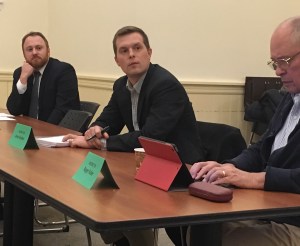LEWISTON — Members of Lewiston’s state legislative delegation told the Lewiston School Committee Wednesday night that Democrats will work to ensure that the will of voters is upheld.
On Nov. 8, Maine voters passed Question 2, which on Jan. 1 will raise taxes by 3 percent on incomes over $200,000. The extra taxes are projected to generate $147 million for education in 2017, of which Lewiston would receive $4 million more per year and Auburn would get $3.26 million more per year.
Throughout the campaign, Gov. Paul LePage opposed Question 2. When the newly elected were sworn into office, the governor said implementation of Question 2 should be delayed.
“About Question 2, what’s going to happen?” Lewiston Assistant Superintendent Tom Jarvis asked.
Lewiston delegation leader Sen. Nate Libby, D-Lewiston, said there’s a sharp partisan divide on Question 2 with Republicans opposed and Democrats in Augusta saying voters’ wishes on Question 2 and other referendums must be upheld.
“Hundreds of thousands of Maine voters came out to vote on these questions,” he said, calling the election a solemn process. “More Mainers voted on these questions, more than for president of the United States. You just can’t roll it back by an act of the Legislature.”
Anyone opposed to Question 2 and another that raises Maine’s minimum wage shouldn’t ask legislators to make changes, Libby said. They should start collecting signatures for another referendum.
What happens to Question 2’s implementation remains to be seen, Libby said, but Democrats “intend to implement this law fully.”
School Committee Chairwoman Linda Scott said there’s fear that changes by legislators will mean fewer dollars to school districts.
What needs to happen is doing “what’s best for the kids in the state of Maine, not what’s best for a political party.”
Rep. Jared Golden, D-Lewiston, said Question 2 is the second time Maine voters have said they want the state share of education to be 55 percent, something the state hasn’t done.
“We’re going to do everything we can as a delegation to make sure that plays out,” Golden said.
Libby said there should be good news for school districts in terms of the upcoming state budget.
“State revenues are up and ahead of projections,” Libby said. “We expect that trend to continue. We are not in the crisis mode we were in four years ago. At the very least, we can bank on what you already have” for state money for schools. “Our expectation is that there should be more.”
Another big topic Wednesday night was inadequate funding of special education.
Last spring, Lewiston’s school budget had more than 50 new positions for special education, School Committee member Tom Shannon said. Some of the new jobs are because of new in-house programs, but many were because more students with special needs are coming to Lewiston.
Despite the extra positions, there are still situations where more staffing is needed, Shannon said. “Funding for special needs students isn’t at the level it should be at,” he said.
Some of the problem is with the federal government, he said, but at the state level, there’s a two-year delay in reimbursements, Jarvis said. Some of that money can’t be recovered because costs rise during the two-year gap, he said.
The state should correct that two-year gap, as well as look at costs and state rules, and see if they can be managed better, Shannon said.
Lewiston educators said there should be a task force to review how special education is funded and make recommendations to state legislators.
Legislators asked for relief from mandates, overtesting
LEWISTON — Two other issues that need attention from legislators, School Committee members said, are state-mandated proficiency-based learning diplomas and reducing the amount of student testing.
When proficiency-based learning and other mandates are implemented in the coming years, if unchanged, it will mean more high school students must take a foreign language, but there’s a shortage of foreign language teachers, school board members said.
Meanwhile, districts are not getting help from the Maine Department of Education to implement new learning standards, School Committee Chairwoman Linda Scott said.
“We feel like our hands are tied,” she said. “We have an exorbitant number of teachers working on (proficiency-based learning),” but each step Lewiston schools take “with no support from the state leaves us with nothing to go forward with.”
Scott said that when trying to figure out what kind of budget Lewiston schools will need, adding in a growing enrollment, higher special education costs plus new mandates, “it’s almost a whirlwind we’re in.”
“We have no place to go,” she said.
Committee member Benjamin Martin told Lewiston state legislators that action needs to be taken to reduce student testing.
“It is by far the biggest issue I hear from parents, whether it’s taking the test, opting out, the money it costs, the benefits.”
Test scores were just released four months into the school year, Martin said. The millions of dollars the state spends on the tests are not being used well, Martin said.
State Sen. Nate Libby, D-Lewiston, said he expects there will be legislation efforts again this year to provide relief.
“We will push hard to try to achieve some change,” he said.

Comments are no longer available on this story